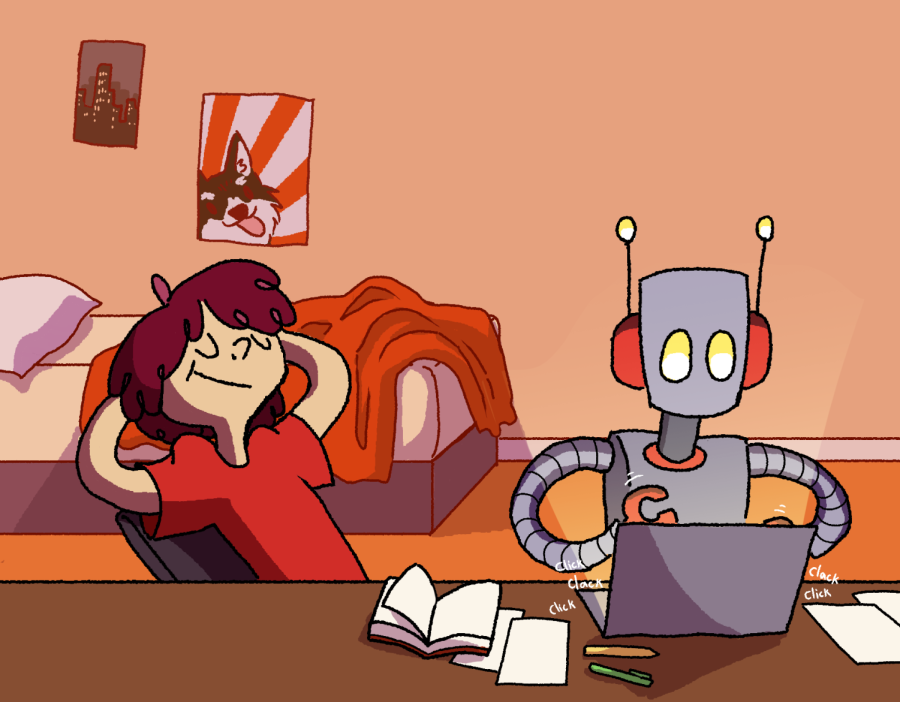The dangers of Artificial Intelligence
A robot behind a computer doing work while the owner of the computer sits off to the side. In recent years, AI has significantly improved to the point where voices of real-life humans can be altered to say things they never said.
April 12, 2023
The development of Artificial Intelligence (AI) is presenting many dangers that can significantly affect society.
Artificial Intelligence is a section of computer science that focuses on the simulation of intelligent behavior within machines and technology and has developed significantly over the last few years with technological advancements.
Moreover, forms of AI such as AI-generated “humans” and deepfakes (AI generated images, videos and audio) have been growing rapidly in popularity recently.
With this progress in technology, we’re now able to make photos that cannot be easily identified as fake.
The emergence of AI generated photos will increase our overwhelmingly discussed issue of spreading misinformation like wildfire on the internet. The fact that AI generated photos can be done to anyone, including politicians, can have very unfortunate results. These images can be used for propaganda and instigating violence.
Just last month, deepfake photos of former President Donald Trump went viral with many believing them to be real.
The original author of the photos, Twitter user Eliot Higgins, made a Twitter thread with over 20 AI-generated images of Trump and his family. The images show Trump cleaning in jail, crying in court and his wife Melania Trump screaming at police officers.
Higgins made it known in his tweet that these photos are fake and were generated using Midjourney – an AI service that produces images based on text prompts – these photos were later saved and reposted without the clarification.
These eerily authentic-looking photos are a clear representation of the scary times that we are currently living in.
Trump is not the first person to fall victim to AI deepfakes. Many women online face the same problem, with their faces being put onto bodies depicting them doing sexual acts.
“More than 90 percent of deepfake victims are women, who are subject to online sexual harassment or abuse through nonconsensual deepfake pornography,” according to the law firm DAC Beachcroft.
The percentage of women who are victims of deepfakes is saddening and should be seen as a top concern when evaluating the ethics of AI. These fake images can ruin someone’s life.
Additionally, there has been an influx of photos of AI-generated “humans” shared on social media.
Last year, a tweet by Fallon Fox, a professional MMA fighter who used Midjourney to create fake images showing polaroids of AI-generated women at a metal concert went viral.
It’s easy to assume that these photos were professionally taken by a photographer and these people were real.
There are many websites such as Bored Humans and Generated.photos where users can purchase and generate images of fake people.
This poses a threat to professionals who do photography for a living, but these photos can just as easily be used by anyone to deceive others.
Dr. David Gunkel, a professor of media studies at NIU, said that for the longest time, society has had the expectation of photos representing reality, but now with the advancement of technology, people can create images that aren’t representative of reality at all.
“We are entering an era in which the relationship of the image to reality is being suspended in ways that really challenge our expectations for how we understand truth and photography,” Gunkel said.
Gunkel believes the real challenge right now is to get out in front of a lot of the problems of AI before they become even bigger social problems.
“We’re going through another one of these phases where we have a new technology that is untested and on the one hand, you have people raising the alarm and moral panic and thinking the world is over,” Gunkel said.
As a result, several states have started limiting the use of AI.
“General artificial intelligence bills or resolutions were introduced in at least 17 states in 2021, and enacted in Alabama, Colorado, Illinois and Mississippi,” according to the National Conference of State Legislatures.
In March, Elon Musk and numerous professionals and AI experts called for a pause on advancing and developing AI.
If there is a pause, hopefully there will be an evaluation of the issue of misusing AI.
“This is a way for them to recalibrate their products to be more successful. I think it actually serves their interests and not necessarily serves the interests of society at large,” Gunkel said.
Gunkel believes other proposals such as rules and regulations for transparency and for accountability are the ones more focused on social impact rather than the industry side of things.
One upside of AI generated photos is that they could potentially make the public warier of believing everything is real online. The emergence of AI generated photos can encourage the public to do their own research to find out the truth.
Gunkel believes that a benefit of AI is that it can do things humans can’t.
“We can look at AI as playing a role that it fills a space in the intelligences where we will not be emulating human intelligence, but rather creating alternative forms of intelligence that can serve our needs and make for a better world for ourselves to live in,” Gunkel said.
Although AI has its benefits, the dangers cannot be ignored. The positives of AI are exciting but the negatives are worrisome. The dangers should be addressed early on so that it is ensured AI has a better impact on society rather than a worse impact.







